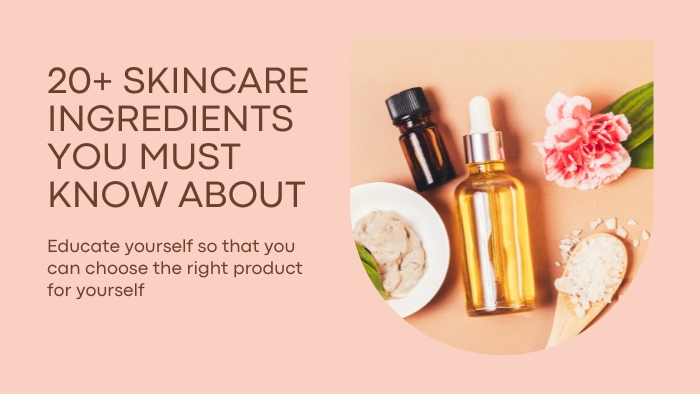Are you tired of being overwhelmed by the endless options of skincare products on the market? Do you ever wonder if you’re using the right ingredients for your skin type and concerns?
Well, look no further because I’ve compiled a list of 20+ skincare ingredients that you must know about!
Whether you’re a skincare newbie or a seasoned pro, learning about these ingredients can help you pick the best products for yourself. So without any further ado, let’s get started!
Hydroxy Acids (AHAs and BHAs)
Hydroxy acids, also known as fruit acids, are a group of water-soluble organic acids commonly used in skincare products to exfoliate the skin.
There are two main types of hydroxy acids: alpha-hydroxy acids (AHAs) and beta-hydroxy acids (BHAs):
Alpha Hydroxy Acids (AHAs)
AHAs are water-soluble acids that work by dissolving the bonds between dead skin cells, allowing them to be easily sloughed off. They are particularly effective at improving the appearance of fine lines, wrinkles, and dull skin. Some popular AHAs include glycolic acid and lactic acid. However, it’s important to note that AHAs can be irritating to some skin types and should be used with caution.
Beta Hydroxy Acids (BHAs)
BHAs are oil-soluble acids that work by penetrating deep into the pores to unclog them. They are particularly effective at treating acne-prone skin and reducing the appearance of pores. Salicylic acid is the most common BHA and is widely used in many skincare products.
When it comes to choosing between AHAs and BHAs, it depends on your skin type and concerns. If you have dry or sensitive skin, AHAs may be too harsh for your skin. BHAs are more suitable for oily or acne-prone skin. However, if you’re unsure which to use, it’s best to consult with a dermatologist.
Glycolic Acid
Glycolic acid is an AHA that is derived from sugar cane. It is excellent for exfoliating the skin, improving texture, and reducing the appearance of fine lines and wrinkles. However, it can be irritating to some skin types and should be used with caution.
Lactic Acid
Lactic acid is another AHA that is milder than glycolic acid and is better suited for sensitive skin types. It is derived from milk and helps to exfoliate the skin, improve texture, and reduce the appearance of fine lines and wrinkles.
Salicylic Acid
Salicylic acid is a BHA that is particularly effective at treating acne-prone skin. It works by penetrating deep into the pores to unclog them and reduce inflammation.
Hydroquinone and Kojic Acid
Hydroquinone and Kojic acid are excellent ingredients for treating hyperpigmentation and dark spots.
Hydroquinone works by inhibiting the production of melanin, while Kojic acid works by blocking tyrosinase, an enzyme responsible for the production of melanin. However, it’s important to use these ingredients with caution as they can be irritating to some skin types.
It’s also worth noting that hydroquinone is a controversial ingredient due to its potential carcinogenic properties and has been banned or restricted in some countries.
As with any skincare ingredient, it’s important to do your research, patch test, and consult with a dermatologist before incorporating it into your skincare routine. Additionally, it’s crucial to use sunscreen daily when using these ingredients as they can increase sensitivity to the sun and further damage the skin.
Other ingredients
Moisturizing Ingredients
Moisturizing is an essential part of any skincare routine as it helps to keep the skin hydrated and prevents dryness. When you moisturize your skin, it creates a protective barrier that locks in moisture and prevents water loss. The following are the most common moisturizing ingredients that are used in skincare products:
Glycerin
Glycerin is a humectant, which means it draws moisture from the environment into the skin, helping to keep it hydrated. It is a common ingredient in moisturizers and other skincare products because of its ability to help skin retain moisture. Glycerin is suitable for all skin types and is usually well-tolerated.
Hyaluronic Acid
Hyaluronic acid is a naturally occurring molecule found in the skin that helps to retain moisture. It is known for its ability to hold up to 1000 times its weight in water, making it an excellent ingredient for hydrating the skin. Hyaluronic acid is commonly used in moisturizers and other skincare products to help keep the skin plump and hydrated.
Ceramides
Ceramides are lipids that are naturally present in the skin’s outer layer. They help to create a protective barrier that keeps moisture in and irritants out. As we age, the levels of ceramides in our skin decrease, leading to dryness and dehydration. Ceramides are commonly used in moisturizers and other skincare products to help replenish the skin’s natural moisture barrier.
Anti-Aging Ingredients
Anti-aging ingredients are substances that can help reduce the appearance of fine lines, wrinkles, and other signs of aging. These ingredients work by stimulating collagen production, improving skin elasticity, and reducing inflammation. The following are the most common anti-aging ingredients that are used in skincare products:
Vitamin E
Vitamin E is an antioxidant that helps to protect the skin from damage caused by free radicals. It is a common ingredient in anti-aging skincare products because it helps to improve the skin’s texture and tone. Vitamin E also has anti-inflammatory properties that can help to reduce redness and irritation.
Copper Peptide
Copper peptides are naturally occurring compounds that stimulate collagen production and improve skin elasticity. They are commonly used in anti-aging skincare products because of their ability to reduce the appearance of fine lines and wrinkles. Copper peptides also have antioxidant properties that can help to protect the skin from damage caused by free radicals.
Retinoids (including tretinoin)
Retinoids are derivatives of vitamin A that are used in skincare products to reduce the appearance of fine lines, wrinkles, and other signs of aging. They work by stimulating collagen production and increasing cell turnover. Retinoids can be very effective, but they can also be irritating to the skin, so it is essential to start using them slowly and gradually build up to higher concentrations.
Acne-Fighting Ingredients
Acne is a common skin condition that affects many people, and it is caused by a variety of factors such as hormonal changes, stress, diet, and genetics. Acne-fighting ingredients help to combat acne by reducing inflammation, unclogging pores, and killing acne-causing bacteria. Here are the three most common acne-fighting ingredients:
Tea Tree Oil (TTO)
Tea tree oil is an essential oil that has antibacterial and anti-inflammatory properties. It is a common ingredient in acne-fighting skin care products because it can help to reduce redness and inflammation and kill acne-causing bacteria.
Sulfur
Sulfur is another natural ingredient that has been used to treat acne for many years. It works by unclogging pores and reducing oil production on the skin. Sulfur also has anti-inflammatory properties that help to reduce the redness and swelling associated with acne. It is often found in acne spot treatments and masks.
Salicylic Acid
Salicylic acid is a beta hydroxy acid (BHA) that is commonly used in acne products. It works by exfoliating the skin and unclogging pores. Salicylic acid also has anti-inflammatory properties that help to reduce redness and swelling. It is often found in acne cleansers, toners, and spot treatments.
Brightening Ingredients
Brightening ingredients are designed to help reduce the appearance of dark spots, hyperpigmentation, and uneven skin tone. Here are three of the most common brightening ingredients:
Mandelic Acid
Mandelic acid is an alpha hydroxy acid (AHA) that is derived from bitter almonds. It works by exfoliating the skin and reducing the appearance of dark spots and hyperpigmentation. Mandelic acid is also less irritating than other AHAs, making it a great option for those with sensitive skin.
Arbutin
Arbutin is a natural skin brightener that is derived from bearberry plants. It works by inhibiting the production of melanin in the skin, which helps to reduce the appearance of dark spots and hyperpigmentation. Arbutin is often found in skin serums and creams.
Kojic Acid
Kojic acid is another natural skin brightener that is derived from fungi. It works by inhibiting the production of melanin in the skin, which helps to reduce the appearance of dark spots and hyperpigmentation. Kojic acid is often found in skin serums and creams.
Unconventional Ingredients
Unconventional ingredients are those that are not commonly found in skincare products but are gaining popularity for their unique properties and potential benefits for the skin. Here are four unconventional ingredients and their potential benefits:
Snail Mucin
Snail mucin is a secretion that snails produce to protect their skin from damage. It is rich in hyaluronic acid, glycolic acid, and peptides, which are all beneficial for the skin. Snail mucin is believed to help hydrate and soothe the skin, reduce the appearance of fine lines and wrinkles, and improve skin texture and elasticity. It is often found in Korean skincare products.
Apple Cider Vinegar
Apple cider vinegar (ACV) is a popular ingredient in skincare due to its antibacterial, antifungal, and anti-inflammatory properties. It is rich in acetic acid and alpha-hydroxy acids (AHAs) that help to exfoliate dead skin cells, unclog pores, and brighten the skin. ACV can also help to balance the skin’s pH levels, which can prevent acne and other skin irritations.
To use ACV in your skincare routine, it is best to dilute it with water before applying it to the skin. A common recipe is to mix one part ACV with two parts water, although the ratio may need to be adjusted depending on your skin’s sensitivity. You can use this mixture as a toner or apply it directly to acne spots as a spot treatment.
Ginseng
Ginseng is a popular ingredient in traditional Korean medicine and is known for its anti-inflammatory and antioxidant properties. It contains ginsenosides, which are believed to help boost collagen production and improve skin elasticity. Ginseng can also improve blood circulation, which can result in a brighter, more even complexion.
Ginseng can be found in a variety of skincare products, including toners, serums, and moisturizers. It is often recommended for mature skin, as it can help to reduce the appearance of fine lines and wrinkles.
Kikumasamune
Kikumasamune is a Japanese skincare brand that is known for its use of sake, a traditional Japanese rice wine, in its products. Sake is rich in kojic acid, which is believed to help brighten the skin and even out skin tone.
Kikumasamune’s most popular product is its High Moist Lotion, which contains sake, arbutin, and ceramides. This lotion is hydrating and brightening, making it a popular choice for people with dry, dull skin. The brand also offers a range of other sake-based products, including cleansers, masks, and creams.
Final Thoughts
In conclusion, taking care of your skin is important for your physical and mental well-being. While many skincare products in the market claim to improve the appearance and health of your skin, it’s crucial to be aware of the potential risks associated with certain ingredients.
By avoiding harmful ingredients and choosing products that are gentle, non-irritating, and tailored to your skin type and concerns, you can achieve healthy and glowing skin without compromising your overall health.
Remember, skincare is not a one-size-fits-all approach, so it’s important to experiment with different products and routines to find what works best for you. And always consult with a dermatologist if you have any concerns or questions about your skin health.


